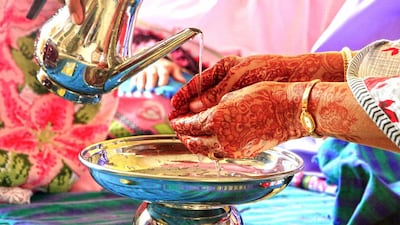A Bohra meal begins by passing the salt. And it is only after each partaker seated around a big platter has tasted it that the first course is served. Bohra Muslims, who are said to have migrated originally from Yemen to Gujarat, are firm believers in the maxim: “The family that eats together, stays together.”
The entire Bohra family dines out of one platter called the thaal. It can typically accommodate eight people. It is elevated with a tarakti (stand) placed on a square piece of cloth called a safra, laid out on the floor. The thaal should not be left unattended, so it is not placed until at least one person is seated for a meal.
During a community meal, food is not served until all eight diners are present, because “the portions served are just right for eight”, according to Priya Badshah, a Mumbai-based mother-of-two. Each dish is placed in the centre of the thaal and every member pulls his or her share. Bohras have a no-wastage policy. Not a single grain of rice is left on the plate when it is taken away.
Outside the home, women and men sit at different thaals and eat using the right hand. “Usage of the left hand is taboo in the thaal, even if is to pick up a spoon to scoop out ice cream,” Badshah says.
All heads should be covered during a meal and Bohra women do so with their pardis (veils) that are part of their traditional brightly coloured and beautifully embroidered or appliquéd ridas, which are worn in place of the abaya. Bohra men are easy to identify in their white topis (head caps) with golden embroidery. Once everyone is seated, one serving member walks with water in a chelamchi lota (a kind of basin and jug) for everyone to wash their hands.
The unending courses
Interestingly, the first, though not the only, course is dessert.
“We consider it auspicious to begin our meal with a sweet dish,” says Arwa Kaka, a Mumbai-based public relations manager. In the Bohra language, all desserts are called mithaas and the savoury dishes kharaas. Bohras love ice cream, so it is served first, unless it’s celebration time, when the sodannu (cooked rice with ghee and sugar) takes the first place.
A meat starter follows and gives way to another dessert. At a Bohra wedding, several courses of kharaas and mithaas are served alternately, but on an ordinary day at home, one round of starters and two desserts is the norm Bohra families follow before the main course, or jaman, appears. Jaman can include a meat dish, which is eaten with chapattis or parathas, and a rice dish that could be anything from a biriyani to kaari chaawal (curry with rice) to dal chaawal palidu (lentil rice with curry – see recipe).
Besides the usual accompaniment of a raita, soup could also be served with the rice. And when it’s time for the jaman to end, it is also time to bring in another round of dessert. But that’s not all. Dry fruits and paan (betel leaves) are a must before the family members taste the salt again to cleanse their tongues. “We Bohras believe that salt cures us of 72 diseases,” Kaka says.
For Bohras, consuming meat is not only a matter of taste but also an act of piousness. “A baby by the age of one is usually ready to taste meat,” says Jumana Murtaza Lakdawala from Dubai, who settled in Halvad, Gujarat, after her marriage. Goat, lamb and chicken are relished, while beef is avoided. Certain types of fish are also eaten, but they have to be caught alive and can be killed only after the saying of “Bismillah” to make it halal.
One food for all
Every Bohra house around the world gets food from a local community centre, called Faize Mawaid-e-Burhani. This community centre caters for all three meals every day of the week except Sundays.
There is no price tag on the food, so families pay whatever they can afford. There are no receipts and no records of payments are maintained. Most well-to-do people make generous donations to keep the centre running and ladies volunteer to make chapattis at the centre.
The idea is to provide quality food to all members of the community, irrespective of whether they can afford it or not.
When it’s time to celebrate
No celebration in a Bohra home is complete without dal chaawal palidu and sodannu. The first day of Muharram is celebrated with a thaal full of 28 to 52 dishes. This is to ensure abundance in the ensuing year. Lachka – crushed and boiled wheat and roasted semolina with oodles of butter, jaggery and dry fruits – is an integral part of this meal. Khichda, a richly flavoured combination of lentils and mutton, garnished with green garlic, is a must on the 10th day of Muharram. Gol sherbet, a lemonade in which jaggery replaces sugar, is garnished with tukmuria seeds and especially relished during Ramadan.
Bohra meals are undergoing changes. Many wedding thaals are now seen serving lasagnes, wontons and sizzlers. “But the age-old tradition of eating together out of one thaal will never change,” concludes Kaka.
artslife@thenational.ae

